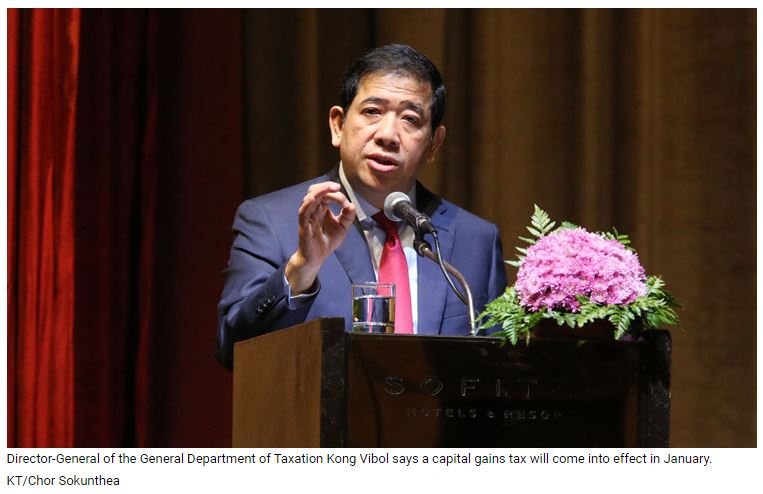Cambodia: Capital gains tax to come into effect in Jan
The Cambodian government will start to implement capital gains tax collection from next year after an initial plan in July this year to boost national revenue, according to the director-general of the General Department of Taxation (GDT).
Kong Vibol said the government and the Ministry of Economy and Finance decided to start implementing collecting the tax from Jan 1.
The idea was mooted on April 1, to be enforced from July but it was decided more time was needed to refine it.
Vibol said a video was being prepared to alert people.
Capital gains tax will apply to all properties and other capital investments such as leasing, stocks as well as foreign currency. It applies to any profits made by transactions within these areas.
Vibol said the idea of a capital gains tax system was first introduced in 2010 and 10 years should have been enough to implement it.
“In some countries, such as France and Australia, the maximum rate of the tax is between 40 and 60 percent, but, for Cambodia, the procedure remains too complicated for both taxpayers and GDT officials,” he said.
According to the directive, the rate of capital gains tax will be fixed at 20 percent of the total value of a property sale.
Anthony Galliano, group chief executive officer of corporate finance firm Cambodian Investment Management Group, said that given the challenges the economy is facing in key sectors such as tourism, garments and real estate, it is prudent and judicious to implement new taxes that will contribute to the national coffers.
“This additional category of conventional tax will provide a safety net should there be a reduction in the collection of existing taxes because of a deterioration in the economy and contraction in companies operating in the Kingdom,” he said. “I have long been an advocate of introducing a capital gains tax which can benefit the government treasury and is a common tax in most countries.”
However, Galliano said its structure needs to be considered in order to positively contribute to government finances without discouraging investments or hindering market activity.
“Jurisdictions such as Singapore and Hong Kong do not have a capital gains tax, which encourages investment, especially in financial services. The Kingdom will be less competitive in this area [if it is imposed]. However, Cambodia has never been considered a tax haven and is not competing in this space,” he said.
“Ideally capital gains taxes should be apportioned into the short-term and long-term, with different rates, and not applied on transactions
of certain assets, in which the government doesn’t want to affect market activity,” he added.
Galliano said the property market has been ripe for the application of a capital gains tax, both for individuals and companies, given the escalation in real estate prices.
Source: https://www.khmertimeskh.com/50757704/capital-gains-tax-to-come-into-effect-in-jan/


 English
English




